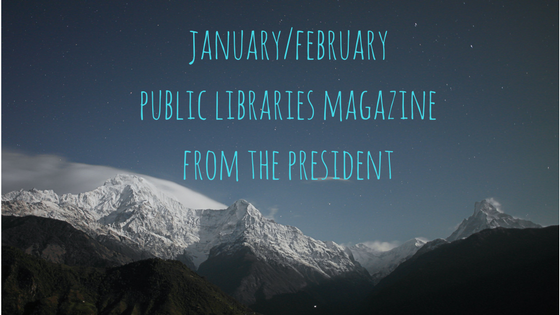Creating Opportunities

PAM SMITH is Director of Anythink Libraries in Thornton (CO). Contact Pam at psmith@anythinklibraries.org. Pam is currently reading Leonardo da Vinci by Walter Isaacson.
“Every social justice movement that I know of has come out of people sitting in small groups, telling their life stories, and discovering that other people have shared experiences.”—Gloria Steinem1
Last year, one of my favorite concerts was seeing Peter Yarrow at Swallow Hill Music Hall in Denver. Swallow Hill is an evolution of the Denver Folklore Center, one of the original folk music venues where Bob Dylan, Judy Collins, Joan Baez, Pete Seeger, Muddy Waters, and Arlo Guthrie played regularly. It has evolved over the years and is now the largest music school and concert venue dedicated to roots, acoustic, and folk music west of Chicago.
Yarrow used the event to take us down memory lane with the music of the sixties and seventies. Listening to “If I Had a Hammer,” “Five Hundred Miles,” “This Land is Your Land,” and, of course, “Pu the Magic Dragon” made me feel like I was a teenaged groupie. Looking around the hall, we had all aged; now the audience was a group of seniors, our hearts still connected to our folk roots. Music is known for inspiring peace, racial and gender equity, and environmental awareness. More than once at the concert, Yarrow asked the audience to sing together and join hands with their neighbors. It was an inspiring evening, one filled with hope—if we could just find a way to understand each other and work together for shared values.
Because our culture is so divided now, the role of public libraries as an anchor in our communities is even more important. Libraries are not only the center of our communities. They help us stay grounded. Public libraries are safe zones, places where all people are welcome and included. Places where it is safe to explore different cultures, food, and religions. Places to be introduced to ideas that might be different. Places where it is safe to have conversations with people you might not know and who you might disagree with. Places of civic discourse.
ALA has sponsored a touring exhibition of the Ken Burns documentary on Vietnam. Our library was privileged to participate. Our team worked with the General Manager of News at Rocky Mountain PBS, Laura Frank, who interviewed a panel of people with Vietnam experiences and history including Pulitzer Prize winning photographer Neal Ulevich, who lives in our neighborhood. The conversation drew more than 100 people, many of them veterans of the Vietnam War. It became clear that evening that people are yearning for opportunities to talk about painful experiences of our past. Public libraries provide that safe space where differing points of view are encouraged.
Another program that our team launched this fall was Breaking Bread, which connects people and cultures through food. The evening was quite simple: bread/bakers/hosts from five different cultures. Each presenter talked about the bread of their culture, how it developed, what it meant to their families, the importance of sharing bread, and so forth. Maria Mayo, our adult guide, described it as “cultural speed dating.” People moved around the room sampling bread and talking with individuals representing France, Libya, Mexico, India, and the United States. Using food as a means of understanding culture helps to bridge cultural divides. It was so powerful for our community that we are repeating this concept throughout the year and other branches are adapting this project.
Every public library is doing programs like these: Creating opportunities for people to talk with each other, listen to a myriad of points of view, break bread together and find that place of shared values and humanity is essential to our democracy.
It is as simple and powerful as shared space, shared compassion, shared humanity. These experiences in our public libraries build trust and bonds that hold our community together. Public libraries have the ability to bring people together, to mend our differences, to bring back civil discourse.
Reference
- Maria Shriver, “Gloria Steinem,” Interview Magazine (July 11, 2011), accessed Feb. 20, 2018.












